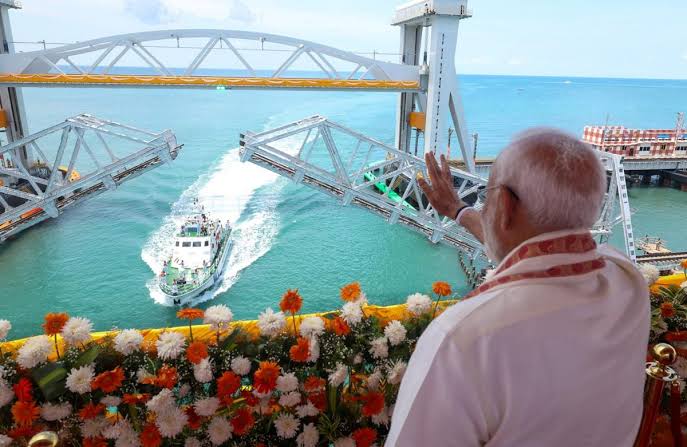India became the 62nd country to support a universal carbon tax of shipping emissions. The historic pact, concluded on the premises of the International Maritime Organization (IMO) in London, represents the world’s first concerted move against carbon pollution coming from the seas.
The agreement comes at the end of a week of intense talks and is a milestone moment for the world’s shipping industry, responsible for almost 3% of global CO₂ emissions. The new carbon-pricing system will drive the sector towards low-carbon fuels, energy-efficient ships, and green ports.
India Welcomes Global Maritime Reform
India’s commitment underlines its increased emphasis on climate leadership and clean development. India has already committed to having 500 GW of renewable capacity by 2030 and net-zero emissions by 2070. This move is also in line with its drive to upgrade infrastructure while minimizing environmental footprint.
“This is not a climate pledge, it’s a strategic move towards cleaner commerce and cleaner shipping,” a senior Indian official who attended the IMO session said.
A Two-Tier Carbon Tax: How It Operates
The IMO-suggested model implements a two-tier carbon charge with greater fines against ships emitting high amounts of pollution and incentives for low-carbon or zero-carbon alternatives. The money will be used to facilitate financing green innovation, assist developing countries, and facilitate a smooth transition to cleaner operations by global fleets.
Main Features:
- Straightforward carbon pricing per ton of CO₂ emitted.
- Incentive for using low-carbon or zero-carbon fuel by ships.
- Facilitate financing for developing countries to make a smooth transition.
Influence on Indian Shipyards and Ports
India will usher in a new chapter of shipping business with the wealthy ports like Mumbai, Chennai, and Mundra. Economists suggest the levy can help to act as a spur towards:
- Green development of ports
- Ship electrification
- Production within India of ecologically friendly vessels
“India’s ship-making industry can develop as a centre for green vessels around the globe,” said one shipping analyst. “This is an enormous innovation and economic chance.”
Mixed Global Responses
While large economies such as China, Japan, Brazil, and the EU were supporting the proposal, Russia, Saudi Arabia, and the UAE opposed it, saying it would distort trade. Others such as Pacific island nations and Argentina abstained, fearing the economic loss to vulnerable economies. Majority support in spite of dissension is a firm commitment towards a greener future of trade.
India’s Strategic Green Partnerships
India is also seeking international collaborations for scaling up its green initiatives. Negotiations are under way with Australia and Singapore to set up green energy corridors and clean trade lanes in the Indo-Pacific region.
The carbon tax would fit into India’s larger initiatives such as:
- PM Gati Shakti for revolution in multimodal transport
- National Hydrogen Mission
- Scaling up solar powered logistics parks
A Climate Wake-Up Call for Shipping
With rising sea levels and extreme weather becoming more common, shipping today is at a crossroads. The new carbon pricing regime sends one message loud and clear, business as usual won’t do.
“The IMO accord is a watershed moment, but implementation is the challenge,” was the opinion of an international climate policy expert. “Monitoring, transparency, and fairness of finance will be essential.”
Conclusion: Charting a Greener Course
India’s support for the carbon tax is not symbolic but is a progressive vision for world trade, environmental justice, and clean energy leadership. By supporting the world’s first carbon charge on ships, India is facilitating global trade towards a cleaner future.
Read Also: Global Push for Sustainability Drives Green Ammonia Production

